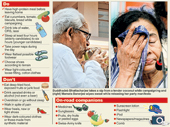 |
Squalls and sharp showers may have made April 2011 less cruel than other years in recent memory, but for the MLA hopeful, the poll heat is on.
And doctors have a word of warning for those canvassing voters for long hours under a merciless sun: unless they watch their step, it could be injurious to health.
With Calcutta going to the polls on April 27, forecasts that the weather would get sultrier around the end of the month — with the maximum temperature set to touch 40 degrees Celsius — could make the situation even tougher for all candidates.
For those with a history of cardiac problems or chronic diseases like asthma, it could be a killer.
Drinking lots of water is of paramount importance, said doctors. “It is important to keep oneself well hydrated. One must also guard against hyponatremia or salt loss. At least three litres of water are a must daily. It is advisable to carry oral rehydration solution (ORS) sachets,” said Sumit Mukherjee, consultant, internal medicine, Fortis Hospitals, Anandapur.
That is one advice that even a seasoned campaigner like Arup Roy, 60, the CPM candidate from Central Howrah, does not follow to the letter, though he tries to “eat healthy, especially at election time”.
“It’s not always possible to carry water. I drink water at roadside shops or at the homes of voters, whom I visit whenever I feel thirsty. But I drink lots of tea,” said Roy, who starts his campaign at 8am and comes back home at 11pm. In between, he comes home for a hasty lunch.
Doctors, however, strongly advocate carrying bottled water, as water is a common source of contamination. While having green coconut water, tea or coffee is fine, aerated drinks are to be avoided at all cost, they add.
The average age of Left Front and Trinamul candidates in the 11 constituencies in Calcutta is 54, and many of them are well into their sixties, making them more susceptible to infections.
“Aerated drinks are a very bad idea when you are out in the sun. They give you lots of calories and increase your blood glucose level. That, in turn, increases insulin secretion and reduces blood glucose, prompting the brain to crave for more sugar, resulting in people reaching out for sweet stuff,” said B. Ramana, bariatric surgeon at Bariatrics and Metabolism Initiative (BMI), Belle Vue Clinic.
As for food, Ramana said that candidates should have a wholesome, high-protein meal before leaving home and then have light meals at regular intervals. A cucumber, a tomato and a glass of lassi would do well for in-between bites, as would biscuits or bread.
“Those out on campaign should try to have 20 grams of carbohydrates every one to two hours,” said Sumit Mukherjee.
Veteran of many elections Subrata Mukherjee, who is contesting from the Ballygunge constituency this time on a Trinamul ticket, however, does not find time for meals in between; neither does Roy of Howrah.
“In the post-lunch campaign, which lasts from 4pm to 11.30pm, I hardly have anything,” said Mukherjee, adding he tries to drink a lot of water and has “hundreds of cups of tea” every day.
Doctors also stress the importance of wearing light colours, loose-fitting cotton clothes and carrying a white umbrella. “The colour black absorbs heat, while white reflects it. So, a black umbrella will not serve the purpose. A white hat could also come in handy, as would sunglasses,” said Sumit Mukherjee, adding a sunscreen lotion of 15 SPF (sun protection factor) or above should be applied to all exposed parts of the body.
Those with chronic diseases should be extra cautious and never forget regular medicines. Diabetics should not miss insulin shots and medicines and should have regular and regulated meals, while asthmatics and those with bronchitis should avoid going too close to crowds.
“Diabetics should carry sweets and chocolates for emergencies like hypoglycaemia (a sudden fall in sugar level) and those with cardiac problems should be alert to angina symptoms and have their GTN (glycerine trinitrate) spray handy,” said Sumit Mukherjee.
But it could be a win-win situation for obese politicians, felt Ramana. “If they can regulate food intake at a time when they are already having to walk a lot more than usual, they could end up losing some weight. The more they walk, the more people they reach out to. Their chances of losing weight would increase if they take to road shows,” he said.










